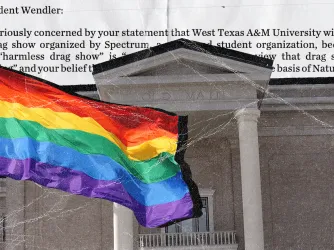Table of Contents
SUNY New Paltz Qualified Immunity Case Before Second Circuit Court of Appeals Today
This morning in downtown Manhattan, the United States Court of Appeals for the Second Circuit heard oral arguments in the case of Holmes v. Poskanzer, et al., 2008 U.S. Dist. LEXIS 13545 (N.D.N.Y. Feb. 21, 2008). At issue today before the Second Circuit is the question of whether the State University of New York - New Paltz administrators who suspended student plaintiffs Justin Holmes and Richard Partington III should have known that conducting a disciplinary hearing without granting the students' request for counsel to be present during the proceedings would violate the students' right to due process under the Fourth and Fourteenth Amendments. If the Second Circuit decides that the state of the law is such that a reasonable university administrator would have known that SUNY New Paltz's policy of conducting disciplinary hearings without counsel would violate the students' due process rights, then defendants lose qualified immunity and may be subject to personal liability for violating the constitutional rights of Holmes and Partington.
Today's argument before the Second Circuit is the latest step in a case that began when Holmes and Partington ran for student government in the spring of 2006. Promising that if elected they would push for increased transparency in institutional decision-making and pressure SUNY New Paltz administrators to reform campus drug policies, Holmes and Partington were elected President and Vice President, respectively. However, shortly after election results were posted, they were involved in an argument with Residence Life Director Corinna Caracci, whom they suspected of attempting to influence the election.
Alleging that Holmes and Partington had "terrorized" her and created a "hostile environment" during the incident, Caracci filed harassment charges against the students, both within the school's judicial system and as criminal charges with the New Paltz Police. Shortly after, Holmes and Partington were arrested for "harassment." Video of the allegedly harassing behavior, as well as eyewitness statements, Caracci's deposition, and the police report, are all available for review here.
Facing both criminal charges and university sanctions, Holmes and Partington sought to be accompanied by counsel during their campus judicial hearings. Their request was denied, pursuant to SUNY policy, and in June 2006 Holmes and Partington were found guilty of harassment by a New Paltz hearing committee and suspended for a year. In August, Holmes and Partington brought a civil suit against several university officials—New Paltz's President, Vice President for Student Affairs, and the two professors who served on the hearing committee adjudicating the harassment charge—alleging, among other claims, that the denial of counsel constituted a violation of their constitutional right to procedural due process.
In January 2007, the federal district court agreed that the denial of counsel was likely a violation of the students' due process rights, particularly because the students here were also facing state criminal charges, and granted Holmes and Partington injunctive relief by ordering them reinstated at New Paltz. In response, defendants filed a motion to dismiss the claim, arguing that it was without merit and that defendants are entitled to qualified immunity as agents of the state. In a further ruling, the district court held that plaintiffs were entitled to qualified immunity on the question of whether the denial of counsel was a violation of plaintiffs' due process rights. In his opinion, U.S. District Judge Lawrence Kahn wrote:
Accordingly, the proper inquiry with regard to the case before this Court is whether the state of the law made it clear to a reasonable university employee that the procedures in place were insufficient to provide Plaintiffs with due process. If officials of reasonable competence could disagree on whether the actions in issue were legal in the specific factual context, then qualified immunity is appropriate. This standard is such that "normally, it is only the `plainly incompetent or those who knowingly violate the law'- those who are not worthy of the mantle of office- who are precluded from claiming the protection of qualified immunity."
As the Court's previous analysis makes clear, the requirement that counsel be present in a consultative role for individuals in Plaintiffs' position is far from clearly established. Indeed, there is no case law in the Second Circuit holding that a specific situation required the presence of counsel at a school disciplinary proceeding to satisfy due process. Accordingly, it would not be clear to a reasonable university employee that the procedures in place were insufficient and Defendants are entitled to qualified immunity with regard to this issue. [Citations omitted.]
The qualified immunity question is now before the Second Circuit on appeal. Ironically, insofar as the case revolves around access to counsel, Holmes and Partington will be making their case pro se—i.e., they are representing themselves.
FIRE will be watching the outcome and will keep Torch readers posted.
Recent Articles
Get the latest free speech news and analysis from FIRE.

The findings against Harvard are a blueprint for a National Campus Speech Code

VICTORY! 5th Circuit blocks West Texas A&M’s unconstitutional drag ban

Wide-ranging coalition of 'friends of the court' continue to support citizen journalist Priscilla Villarreal in her return to the Supreme Court
